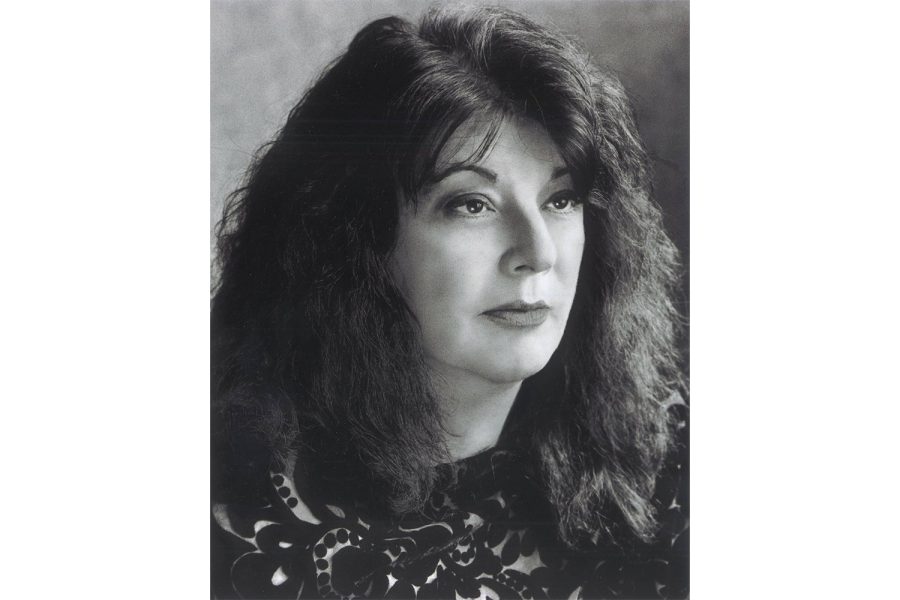Ask the Author | Jean Thompson
Author Jean Thompson published her fifteenth book, The Poet’s House, on July 12. Shortly after, she gave a reading at Prairie Lights in Iowa City, and spoke about the novel, which seeks to poke fun at and provide commentary on the culture among writers, specifically the subculture of poets.
August 23, 2022
Jean Thompson has published fifteen books over the span of her career. She is a recipient of the Guggenheim Fellowship, has won the Pushcart Prize, has been featured in publications like Best American Short Stories and The New Yorker, and was a National Book Award Finalist for Who Do You Love in 1999. Thompson received her undergraduate degree from the University of Illinois Urbana-Champaign as well as an MFA from Bowling Green State University. Thompson visited Iowa City in July to read an excerpt from The Poet’s House, her most recent novel, to a crowd at Prairie Lights. Additionally, Thompson’s novel titled The Year We Left Home is largely set in Iowa and Iowa City.
The Daily Iowan: What was the inspiration for The Poet’s House?
Thompson: You spend most of your life writing and you find you have opinions about it, and the people who practice it, so it seemed like a good time to, and I think there’s a lot of comedy in the book. I hope, and I think, I wanted to write something that was just a little bit more jolly, lighthearted. But it’s a coming-of-age story. There is a young woman who, she’s just kind of moping along. She works for a landscaper which she’s satisfied, sort of, with that, but all her mother and her boyfriend keep saying is ‘oh, you could do better. You could do better,’ but she has difficulties in reading. She has a reading difficulty, so schooling has been hard for her. She’s about 21, and she falls into this group of poets. She does a landscaping job for this famous older woman who’s a poet, a kind of a cult figure, but when I say ‘famous and well known,’ I mean, among poets. I don’t mean that she gave the inaugural address like Amanda Gorman — but she comes to know some of these people, and she comes to know poetry because she hears it spoken aloud. She doesn’t have to read it on the page, and she gets very involved in that world and finds some possibilities for herself. She comes into her own and she’s not necessarily a writer, or a poet, but she sees what this other life is like and how it can empower people and how it can empower her. So, a lot of the poets in the book I have a lot of fun with because sometimes we’re kind of silly. I suppose one idea is that you could be kind of a peculiar person. You could be frivolous or eccentric or whatever, and this has been my experience with a lot of poets, but then they’ll get up on a stage and they’ll read something and you’ll go, ‘Oh, my God, what, just what just came out of your mouth?’ So, there’s this difference between our personalities and the work itself.
DI: What do you believe is special about poetry among the different forms of writing?
Thompson: Well, poets aren’t in it for the money necessarily. A lot of fiction writers aren’t either because there’s not that much money, but in poetry, it’s more of pure art for art’s sake. I think you’re doing it because you love it. You’re doing it because you feel called upon to do it, and that’s true of other fiction writers too. But I just read poets as like, the high priests of writing, in a way. Poetry is really the purest kind of art you can make out of language, and the one that has the most risks involved. I think, on one hand, it’s easier to do. On the other hand, it’s really hard to do it at a very high level. There’s a character in the book who’s an aspiring poet. She’s not a very nice character, Barb is her name, but I gave her a speech in which she says ‘yes, you sit on your butt and you write non-stop day and night and day and night you, some of it’s crap and a lot of it’s crap. And then finally, there’s something you think is good and it’s published in a literary magazine, so you can just sell three copies at a bookfair for nothing, and then you go home, and you do it all over again.’ In other words, there’s that kind of agony about it. The same is often true about writing fiction, but there can be rewards. No poet ever said, ‘Yeah, I sold the movie rights.’ Not to my book of poetry.
DI: What does your artistic process look like?
Thompson: Get up, walk the dog, have breakfast, sit in front of a computer for two or three hours, take the dog out, get groceries, do the laundry, and if I’m not doing anything else, my life can be really boring. Just putting in the hours I think is as important as anything. There’s a Joan Didion quote, I think it’s ‘you can fool around, and you cannot do anything well, either, but if you put in the hours for two days, then on the third day, something will be revealed.’ So, work ethic pays off, perseverance pays off, discipline pays off, and work habits pay off. Poets can be a little bit more irregular; I mean they do have to be good, but they can get up in the morning and write a poem that day, or at least a draft. It doesn’t happen [like that] with fiction. Very seldom do you not get up and write a novel or a short story for that matter.



